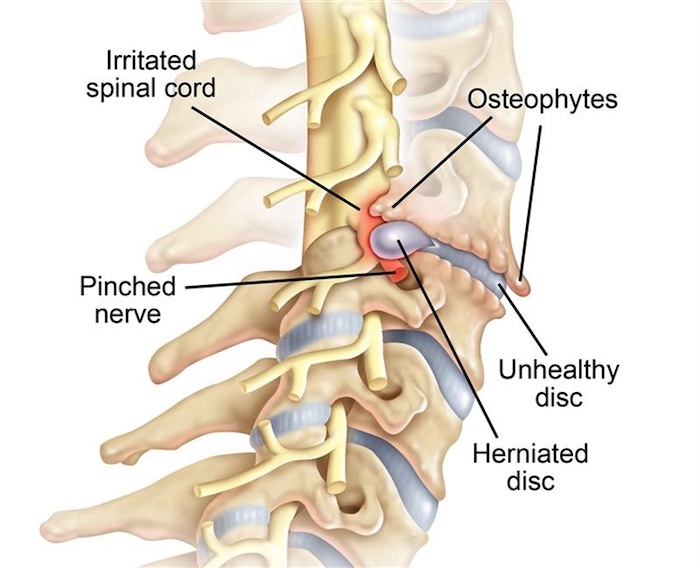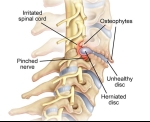
When a doctor says you have a pinched nerve in your neck or back, it typically means that a compressed or inflamed nerve root is sending pain, tingling, numbness, and/or weakness into the arm or leg. These symptoms may be caused by a herniated disc, bone spur, or other spinal degeneration or injury. Let’s take a look at how long a pinched nerve and its related pain typically lasts.
How Long Before A Pinched Nerve Feels Better?
When a pinched nerve root causes neurological deficit, such as numbness or weakness, the clinical description is called radiculopathy. Cervical radiculopathy occurs when a nerve root in the neck is pinched, causing numbness, pain, or weakness in the arm, whereas lumbar radiculopathy occurs when a nerve in the lower back is pinched and causes numbness, pain, or weakness in the leg. A pinched nerve root can also cause radicular pain with or without radiculopathy.
Most of the time, symptoms from a pinched nerve will start to feel better within 6 to 12 weeks of nonsurgical treatment. Even in cases when a pinched nerve involves debilitating radicular pain, such as a burning or shock-like pain that radiates down the arm or leg, it typically improves with time, rest, and nonsurgical treatment.
How long pinched nerve symptoms last can depend on many factors, including how your immune system responds, what is causing the compression or inflammation, and to what degree it is compressed. A pinched nerve that is caused by a herniated disc tends to resolve if given enough time and treatment. One study found that cervical radiculopathy caused by a herniated disc usually significantly improved within 4 to 6 months.1
Treatment Plan for A Pinched Nerve
Radicular pain and radiculopathy caused by a pinched nerve can typically be relieved by nonsurgical treatments. Some initial treatments may include:
- A short period of rest or modified activities to avoid irritating the nerve and causing a flare-up of symptoms
- Nonsteroidal anti-inflammatory drugs (NSAIDs), such as aspirin, ibuprofen, or naproxen
- Heat or ice applications for 15 or 20 minutes at a time, with a 2-hour break between applications to protect skin
- Physical therapy to improve the neck or back’s strength, flexibility, and posture, which may relieve nerve inflammation
- Epidural steroid injections to bathe inflamed nerve in anti-inflammatory medication
- Chiropractic care including cervical traction to help alleviate cervical radiculopathy
In rare cases when symptoms have not responded to 6 or 12 weeks of nonsurgical treatment, or you have severe weakness or intractable pain, surgery may be considered.
Visit a doctor if you have symptoms of pain, tingling, numbness, or weakness that radiate into the arm or leg. The sooner you seek medical attention, the sooner you can receive an accurate diagnosis and start an effective treatment plan.
Precision Pain Care and Rehabilitation has two convenient locations in Richmond Hill – Queens and New Hyde Park – Long Island. Call the Richmond Hill office at (718) 215-1888, or (516) 419-4480 for the Long Island office, to arrange an appointment with our Interventional Pain Management Specialist, Dr. Jeffrey Chacko.













